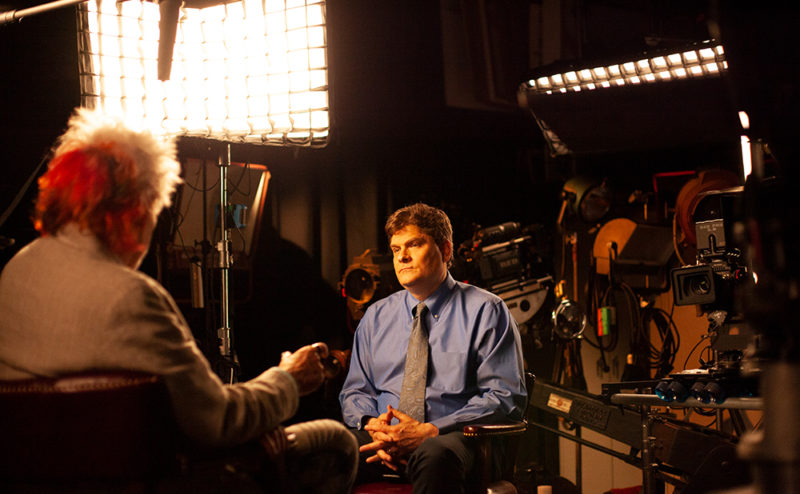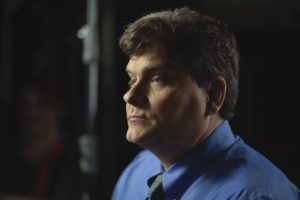
Filmmaking | Local Industry | New England | Reports
Re-Opening the New England film industry
Dr. Paul Heinzelmann, MD (aka Dr. Paul) plays the role of a cautious chaperon in helping the local film industry restart safely in New England.
Filmmaker Jonathan Schwartz and actor Chuck Slavin share the advice of Paul Heinzelmann, MD, MPH—aka Dr. Paul—on how to create safer and healthier film sets in the time of COVID-19.
Interviewed by Jonathan P. Schwartz and Contributed by Chuck Slavin
Thousands of New England residents work on feature, documentary, and independent films. They all rely on safe locations to shoot and create. But in the era of COVID-19, concerns of the safety for casts and crew on film sets have changed dramatically. With the sharing of tools, cameras, cables and camaraderie comes the risk of cross contamination.
Film set physician Paul Heinzelmann, MD, MPH—aka Dr. Paul—is a reluctant chaperon to the reboot of the film industry. As he sifts through white papers, edicts, and recommendations from SAG-AFTRA, American Film Market, and even the British Film Commission, and Bectu on best practices in the shadow of COVID-19, he worries, who will enforce these tough new protocols?

Dr. Paul helps set back-to-work guidelines for the local film industry.
Dr. Paul is well-equipped to be part of the consortium grappling with re-opening. A Massachusetts General Hospital physician, he trained in global public health at Harvard and joined the lineup to treat COVID-19 patients.
Also the founder of SetMD, Dr. Paul examines, treats, conducts telemedicine and refers medical care to visiting movie stars, directors, and producers who come to New England. Now, SetMD is responding by helping control COVID-19 contagion, through case management, apps and contact tracing. All the while, he gently champions health and safety for cast and crew. As host of Safer Sets, a series by filmmaker Jonathan Schwartz, Dr. Paul addresses health issues facing cast and crew.
For example, in love, fight, crowd and crime scenes, the doubles, extras, and stunt persons tend to be on top of one another. So, now, certain scenes are being written out of scripts entirely, slated to be shot at perspective shrinking angles, or created with CGI. It’s the new COVID-19 choreography. Finished on set? Get yourself to your department’s designated holding area and hang tight.
If an actor can do their own makeup or dress themselves, they should. Makeup, wardrobe, audio and props touch people or touch what actors touch, so work commences, punctuates, and wraps with wipe-downs. Glorious meal buffets cede to staggered take-out eaten in separate vehicles to reduce congregation. All units are asked to keep gear and materials personalized.
Creative huddles are social distancing at its worst. Enter the gear heads, enabling unprecedented collaborations over off-site tablets and open comms headsets. Who is troubleshooting the tech ramp up? Will such healthy reforms eventually back-slide?
Dr. Paul grows somber over the Achilles’ heel of the film industry, and linkages with COVID-19 containment. Film workers are brazenly sleep-deprived, exacerbating vehicle and set accidents, health vulnerabilities, and lower immunity. Worse than averaging 13-hour days is chasing shifting call times, amounting to less restorative sleep. When crews are bone-tired at a day’s end, hospital-grade sanitation might be far from their mind. COVID-19 prevention is time consuming and requires fastidious fine-tuning. It causes even longer work days.
Chris O’Donnell, Business Agent for IATSE Local 481, a craft and technical union, told Dr Paul that he has encouraged that every production department to adapt procedures for the perils of COVID-19, and then codify and share results. He too sees a renewed interest in a healthier industry.
Exhaustion hits the prefrontal cortex first, twisting judgement, per fatigue expert Mike Harnett. Can sleep deficits cause a slip up on a health assessment, or slow a producer’s reaction to an urgent report from the COVID-19 officer? A strict 10-hour workday helps crew, staff and cast stay properly cocooned. But short days mean more days—not a particularly popular idea with the budget folks or those who relish extra pay through overtime.
There are still PPE supply shortages. Gloves often give a false sense of security. And face shields are often used without masks. Anti-residue foggers, respirators, and UV wands must be used precisely to be effective. Newly anointed COVID-19 supervisors need cooperation from writers and managers so that scripts and workflows match new regimes. Enhanced security is also key to keep cast and crew apart from the public. Freewheeling reality shows and behind-the-scenes photography are best just canceled at this point. Location supervisors will have to skip lived-in interior locations. Location scouting will be remote; casting calls and read throughs online.
Some productions have the resources and leadership to adopt the gold standard: Testing prior to arrival, then quarantining-private transport-renewed quarantines prior to shooting. Crews boxed in while on break. High filtration HVAC upgrades. Hand-washing stations everywhere. Paid leave if sick. Base camp-to-set cycling options and support for self-care regimes boosting resilience.
Dr. Paul cautions that the integration of COVID-19 protocols into filmmaking is going to be disruptive. If it happens without that care and coordination, it could launch an even larger setback.
For more information on Jonathan Schwartz, visit https://www.linkedin.com/in/interlockmedia/
Chuck Slavin is a New England native who often works as an Actor, a tenacious Advocate, and as Miscellaneous Crew. He is a Union member of SAG-AFTRA, IATSE local 11, and IBEW 1228. He has over 10+ years working full-time in the local New England film industry. Chuck serves the SAG-AFTRA local board, the Women in Film and Television New England board, the Massachusetts Artists Leadership Coalition’s steering committee, and Arts|Learning.
Recently Chuck began a podcast (BrickBox) that has a discussion on post pandemic production and guest Paul Heinzelman, MD joined that conversation as well. For more information, visit www.chuckslavin.com











